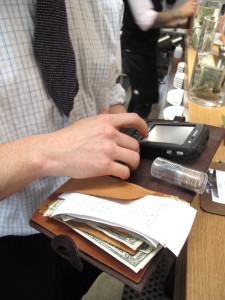October 13th, 2014 by Elma Jane
Non-cash payments volumes are expected to increase by nearly 10% percent to reach 366 billion transactions in 2013, fueled by strong growth in developing markets and mobile payments.
Overall, more than half of global non-cash payment growth comes from developing countries despite them only making up one quarter of the market size at 93 billion transactions. China remains a relatively underdeveloped market for non-cash transactions but its population and growth rate suggest in certain conditions that it could soon outstrip the US and Euro-zone within the next five years.
China is one to watch over the coming years, with the report showing that if growth rates remain at the current high level, it could become the largest market for non-cash transactions within just five years. These soaring growth rates in key markets put pressure on the global payments arena to innovate to meet rapidly increasing consumer demand.
Increased use of tablets and smartphones is creating a convergence of e- and m- payments, posing new challenges for Payments Services Providers (PSPs). In 2015, m-payments are projected to grow at 60.8% while e-payments growth is forecast to decelerate to 15.9% annually over the next year, as more people use mobile devices to make payments.
This trend is adding to the pressure on PSPs to modernize their payments processing infrastructures, ideally based around a single integrated payments platform for corporate and retail payments and a central hub.
The growth of the industry coupled with the fast pace of new regulation requires flexibility from PSPs to adapt, initiatives such as real-time payments, pressure on card interchange fees and improved payments governance as examples of cascading regulation.
Posted in Best Practices for Merchants Tagged with: card, card interchange fees, consumer, e-payments, global payments, m-payments, Mobile Devices, Mobile Payments, Non-cash payments, payments platform, payments processing, Payments Services Providers, psps, real-time payments, retail payments, Smartphones, tablets, transactions
December 5th, 2013 by Elma Jane
Three key benefits mPOS can provide PSPs. mPOS:
1. Maintains A Continuity Of Operations
mPOS solutions also ease the process of accepting and approving payments, according to the white paper. By enabling face-to-face card present transactions, mPOS allows transactions to be conducted in a highly secure manner. Further, once the encrypted transaction data is decrypted securely by the PSP at the payment gateway (with no access granted to the merchant), the onward presentation of the data into the acquiring network is consistent with that used historically for traditional POS terminals.
2. Simplifies Merchant Support
Thales suggests the biggest benefit to PSPs is that mPOS reduces the variety of costs PSPs need to cover to support merchants, cutting expenses related to equipment, security and PCI DSS compliance. This, the white paper says, allows PSPs that utilize mPOS to better allocate resources toward handling higher transaction volumes and acquiring business.
3. Supports Both Magnetic Stripe and EMV Cards
Another benefit to PSPs is that mPOS, despite its recent entrance to the market, is already widely available. The white paper explains that since the mPOS revolution quickly migrated from the U.S. abroad, mPOS solutions now exist to serve the unique needs of both markets. While this means challenges for merchants operating globally, PSPs benefit from being able to address the needs of merchants who want to opt for any and all available market solutions.
Much has been said about the recent explosion of the mobile point-of-sale (mPOS) market and how micromerchants are driving this payments revolution. But, what this story doesn’t communicate effectively is that small merchants aren’t the only stakeholders benefiting from the ongoing mPOS migration.
Payment service providers (PSPs) are another member of the mPOS value chain that can gain flexibility and security through these solutions, new research from data protection solution provider Thales suggests.
“Both merchants and PSPs have operational and logistical issues with traditional POS terminals associated mainly with the highly controlled and certified environment in which they must be used,” Thales writes in its latest white paper on the topic, “mPOS: Secure Mobile Card Acceptance.”
The 27-page white paper provides an extensive overview of the ongoing POS revolution, explaining how mPOS can reduce friction and costs for merchants, illustrating how the technology works step-by-step and highlighting the roles that each stakeholder plays along the value chain.
Posted in Electronic Payments, Mobile Payments, Mobile Point of Sale, Payment Card Industry PCI Security, Point of Sale, Smartphone Tagged with: acceptance, acquiring network, card present, compliance, decrypted, DSS, emv cards, encrypted, face-to-face, magnetic stripe, merchant, micromerchants, migration, mobile card, mobile point of sale, MPOS, payment gateway, payment service providers, payments, PCI, POS, psps, secure, securely, Security, terminals, transactions

